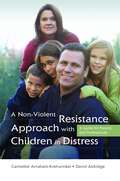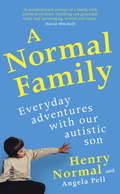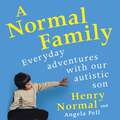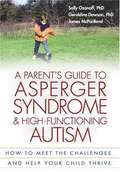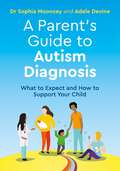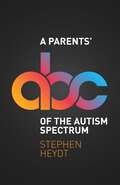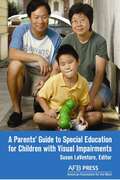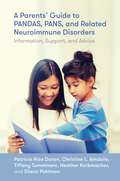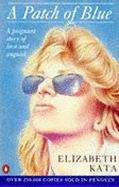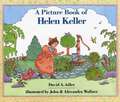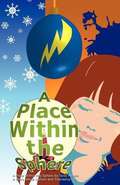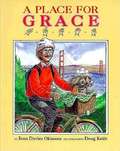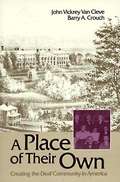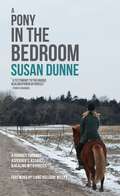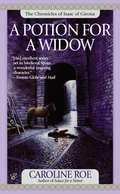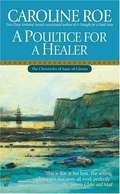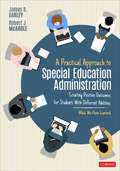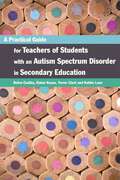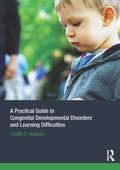- Table View
- List View
A Non-Violent Resistance Approach with Children in Distress
by David Aldridge Carmelite Avraham-KrehwinkelParents, teachers and other professionals often struggle to know how to deal with disruptive, abusive or aggressive behaviour. This book addresses the urgent need for a realistic, practical and effective approach to dealing with severe disruptive behaviour in children and adolescents. Adapting the principles of non-violent resistance originally advocated by Mahatma Gandhi, the book provides de-escalation techniques which empower the adult and unburden the distressed child. The authors outline the theoretical basis upon which the approach was developed, and explain how and why it can be so effective. Case studies demonstrate how the approach can be used to reach more successful places with unhappy and disruptive children of different ages. A separate section for parents provides useful advice on how to take the theoretical material and use it to deal with problematic behaviour in everyday life. As effective as it is original, this approach will empower desperate parents and despairing caregivers by equipping them with hands-on tools to contain, counter and positively direct the aggression and opposition which they face from children in distress.
A Normal Family: Everyday adventures with our autistic son
by Henry Normal'A wonderful self-portrait of a family with autism at its heart. Uplifting and grounded, frank and encouraging, serious and funny, A Normal Family affirms that there is life after an ASD diagnosis - an atypical life, yes, but an abundant and nourishing life just the same' David Mitchell, author of THE REASON I JUMPJohnny is nineteen. He likes music, art and going to the beach. He is also autistic - in his case that means he will probably never get a job, never have a girlfriend, never leave home. And over the last two decades this is what his father, TV producer and comedy writer Henry Normal, and mother, Angela Pell, have been trying to come to terms with. This is a book for anyone whose life has been touched by autism - it's about the hope, the despair, and the messy, honest, sometimes funny day-to-day world of autism, as well as a wonderful, warm book about the unconditional, unconventional love between a father, a mother and a son.'The book is about how [Henry] grieved for the life that Johnny isn't able to have - and learnt to celebrate the one that he does' The Times'Candid and funny' Radio Times'Honest but funny' Sunday Express'Pell and Normal describe hopes shattered, dreams deferred and victories gained in this brave, funny, and searingly honest memoir' Daily Express
A Normal Family: Everyday adventures with our autistic son
by Henry Normal'A wonderful self-portrait of a family with autism at its heart. Uplifting and grounded, frank and encouraging, serious and funny, A Normal Family affirms that there is life after an ASD diagnosis - an atypical life, yes, but an abundant and nourishing life just the same' David Mitchell, author of THE REASON I JUMPJohnny is nineteen. He likes music, art and going to the beach. He is also autistic - in his case that means he will probably never get a job, never have a girlfriend, never leave home. And over the last two decades this is what his father, TV producer and comedy writer Henry Normal, and mother, Angela Pell, have been trying to come to terms with. This is a book for anyone whose life has been touched by autism - it's about the hope, the despair, and the messy, honest, sometimes funny day-to-day world of autism, as well as a wonderful, warm book about the unconditional, unconventional love between a father, a mother and a son.'The book is about how [Henry] grieved for the life that Johnny isn't able to have - and learnt to celebrate the one that he does' The Times'Candid and funny' Radio Times'Honest but funny' Sunday Express'Pell and Normal describe hopes shattered, dreams deferred and victories gained in this brave, funny, and searingly honest memoir' Daily Express(P)2018 Hodder & Stoughton Limited
A Paraprofessional's Handbook for Working with Students Who Are Visually Impaired
by Cyral Miller Nancy LevackThis book was written to help increase the effectiveness of paraprofessionals and identify ways to help them work with the visually impaired. It stresses team work with other education professionals and gives first hand suggestions to overcome challenges to help the student grow.
A Parent's Guide to Asperger Syndrome & High-Functioning Autism: How to Meet the Challenges and Help Your Child Thrive
by Sally Ozonoff Geraldine Dawson James McpartlandEmphasizing how to build on the talents and strengths of a high-functioning autistic child, it contains many useful case histories along with scientific and practical information.
A Parent's Guide to Autism Diagnosis: What to Expect and How to Support Your Child
by Adele Devine Sophia MoonceyAutism diagnosis can be an overwhelming time for many families. This is an accessible, easy to navigate guide for parents, answering the questions they may have before, during and after diagnosis. Written by a highly experienced author team, this book will support parents from the moment somebody mentions autism, through the diagnosis process and beyond. It provides reliable advice on every stage, with guidance on what to do during the long wait for assessment and diagnosis. Working from a pro-neurodiversity perspective it encourages parents to see beyond the diagnosis and to celebrate each child's unique personality and strengths. Combining information on medical diagnosis, educational needs and more, the book shares case studies and direct quotes from families to help parents to give their children the best start following an autism diagnosis, and help them to achieve their full potential. There is also a bonus downloadable chapter with information from the key professionals involved in the diagnostic process, so you know who you can turn to for the support and help you need.
A Parents' ABC of the Autism Spectrum
by Stephen HeydtCovering everything from Anxiety to Fragile-X Syndrome, Stephen Heydt provides an alphabetical categorisation of the possible issues a child with autism spectrum disorder (ASD) may encounter. Written by an experienced clinical psychologist, this book offers information for parents whose children have been diagnosed with ASD, and is presented in an easy-to-use A to Z format. In a return to core understandings of ASD, the author translates difficult behavioural issues into practical information and strategies. Designed for parents and carers in a methodical order, A Parent's ABC of the Autism Spectrum will help explain the challenges of living with childhood ASD.
A Parents' Guide to Special Education for Children with Visual Impairments
by Susan LaventureThis handbook for parents, family members and caregivers of children with visual impairments explains special education services that these children are likely to need and to which they are entitled--and how to ensure that they receive them. Edited and written by experienced parents and professionals, this helpful and easy to use resource addresses the effect of visual impairment on a childs ability to learn and the services and educational programming that are essential for them to get the best education possible. Chapters address early intervention, assessment, different types of services, IEPs, accommodations and adaptations, different types of placements, children with other disabilities in addition to visual impairment, and negotiation and advocacy.
A Parents’ Guide to PANDAS, PANS, and Related Neuroimmune Disorders: Information, Support, and Advice
by Patricia Rice Doran Diana Pohlman Christine Leininger Amabile Tiffany Tumminaro Heather Rain KorbmacherHaving a child who suddenly develops PANDAS (Pediatric Autoimmune Neuropsychiatric Disorders Associated with Strep), PANS (Pediatric Acute-onset Neuropsychiatric Syndrome) or related conditions such as encephalitis can be a daunting challenge for parents. This clear guide explains the symptoms and diagnosis of PANDAS and PANS, with treatment options and recommended strategies for supporting children at home, at school, and in community settings.The book covers key symptoms including OCD, tics, anxiety, sensory issues and personality changes, with practical advice on medical management, nutrition, lifestyle, and addressing social and behavioural needs. Each chapter also includes handy sidebars with key information to remember, and action steps for overcoming challenges, managing relapse, family self-care and providing children with the best possible support.
A Patch of Blue
by Elizabeth Kata(back of book) Her mother was a prostitute, her father a murderer, her grandfather a drunkard. She was eighteen years old and beautiful. And blind. And her life was bleak, and narrow, and confined, and she hated the only colour she could see -- which was black. Then one day she meets Gordon. Set in New York, A Patch of Blue has been a bestseller for many years. Out of violence and despair Elizabeth Kata has created a tender and moving love story that touches one of the central issues of our day. Originally published under the title Be Ready With Bells and Drums
A Patch of Blue
by Elizabeth KataSelina is blind and strings beads to make money to contribute to her household. She is eighteen years old and lives with her mother and grandfather in a single room apartment. One day she goes to the park to work and meets a man with whom she falls in love. What she doesn't know is that he is a black man. The man wants to help Selina escape the sheltered and crippling life that she is living. In the end, Selina's ignorance and unthinking acceptance of her family's poor values cause Selina to do harm to a person who has done nothing but kindness to her.
A Personal Matter
by John Nathan Kenzaburo OëA father comes to terms with his abnormal child, by the Nobel Prize winner for Literature.
A Picture Book of Helen Keller
by David A. AdlerA brief biography of the woman who overcame her handicaps of being both blind and deaf.
A Place Called Acceptance: Ministry with Families of Children with Disabilities
by Kathleen Deyer BolducThis is an excellent resource for those whose ministry involves disabled children.
A Place Within the Sphere
by Tanis MorranEsmeralda Mrky sees herself as an outsider, cut off from other girls her age. Her friendship with Savannah Andreason, who has autism, helps her appreciate her own uniqueness and the power of her imagination. The book has some fantasy elements involving a magic Christmas ornament that transports Esmeralda into alternate realities.
A Place for Grace
by Jean Davies Okimoto<P>Grace is a little dog with big dreams. She longs to be a seeing-eye dog, but is disappointed when she finds that she is too small for guide dog school. Grace isn't discouraged for long, though. She's discovered by Charlie, a deaf man who sees her perform a remarkable rescue and who knows a way she can use her eagerness and courage to help other people. <P>Charlie takes Grace to a hearing dog program, where she learns the skills dogs need to assist the hearing impaired throughout the day. School is difficult for Grace, but thanks to the flexibility of Mrs. Lombardi, the program director, and Charlie's encouragement, Grace finally succeeds in her own inimitable way. <P>A Place for Grace introduces children to the challenges of the hearing impaired and gives them the opportunity to see how people communicate through American Sign Language. Charlie uses some creative problem-solving to help Grace complete the hearing dog program; her struggles, hard work, and ultimate triumph make Grace an inspiring model for children facing obstacles in school and family life.
A Place of Their Own: Creating the Deaf Community in America
by John Vickrey Van Cleve Barry A. CrouchThe book is an attempt to provide a coherent look at important aspects of the process whereby deaf Americans became the American deaf community.
A Pony in the Bedroom: A Journey through Asperger's, Assault, and Healing with Horses
by Liane Holliday Willey Susan DunneSusan Dunne's life changed forever when a chance question from a doctor led her back to horses, an unfulfilled childhood passion. Detached and isolated due to undiagnosed autism, Susan had already survived rape, battled eating disorders and self-harm, and spent time homeless, when her world was turned upside again by a vicious, life-threatening assault. Severe post-traumatic stress disorder left her feeling distrustful and more cut off than ever before from a world she saw as confusing and dangerous. But as Susan's connection with horses grew stronger, her world started to open up. Poignant and witty by turns, Susan shares her story of survival and transformation, offering a rare insight into her relationship with horses, and how they helped her to find a safe place in the world.
A Potion for a Widow (Chronicles of Isaac of Girona #5)
by Caroline RoeThis is an excellent series set in 14th-century Spain. The sleuth is Isaac, a blind Jewish physician. He is often accompanied by his two assistance, his daughter Raquel, and a young moorish boy Yusuf who is apprenticed to him. Isaac and his family find themselves caught up in political and religious intrigue.
A Poultice for a Healer (Chronicles of Isaac of Girona #7)
by Caroline RoeIsaac of Girona returns in the two-time Anthony Award-nominated series. Isaac's duty to the ailing Bishop postpones his daughter's wedding. But murder can't be rescheduled when a wounded messenger dies before delivering an urgent missive for the Bishop.
A Practical Approach to Special Education Administration: Creating Positive Outcomes for Students With Different Abilities
by James B. Earley Robert J. McArdleYour guide to excelling in the complex role of a special education administrator The job of the administrator of special education is arguably one of the most difficult in a school district—and that complexity can be overwhelming. It requires an aspect of every administrative job in the district, including budgets, human resources, student advocacy, and curriculum and assessment. Written by two veteran special education administrators with more than 100 years of combined experience, this book shows current and aspiring special education administrators how to excel in the many demanding areas of their position, allowing them to be effective administrators and educational leaders. Among the many topics included in the book are The importance of visibility in the form of face-to-face interactions to assist staff, students, and building principals The importance of parents in the process The significance of confidentiality, due process, program development, and working with advocates Insight into decision-making and relationship-building A critical tool in any special education administrator′s box, as well as building administrators, central office administrators and school committee members, this book provides practical and friendly advice for a difficult but critical job.
A Practical Approach to Special Education Administration: Creating Positive Outcomes for Students With Different Abilities
by James B. Earley Robert J. McArdleYour guide to excelling in the complex role of a special education administrator The job of the administrator of special education is arguably one of the most difficult in a school district—and that complexity can be overwhelming. It requires an aspect of every administrative job in the district, including budgets, human resources, student advocacy, and curriculum and assessment. Written by two veteran special education administrators with more than 100 years of combined experience, this book shows current and aspiring special education administrators how to excel in the many demanding areas of their position, allowing them to be effective administrators and educational leaders. Among the many topics included in the book are The importance of visibility in the form of face-to-face interactions to assist staff, students, and building principals The importance of parents in the process The significance of confidentiality, due process, program development, and working with advocates Insight into decision-making and relationship-building A critical tool in any special education administrator′s box, as well as building administrators, central office administrators and school committee members, this book provides practical and friendly advice for a difficult but critical job.
A Practical Guide for Teachers of Students with an Autism Spectrum Disorder in Secondary Education
by Kathleen Lane Elaine Keane Debra Costley Trevor ClarkStudents on the autism spectrum often face difficulties in the secondary education environment that result from a lack of awareness on the part of their teachers and peers. This guide acquaints teachers with all the information and practical tools needed to understand and support their students with autism spectrum disorders (ASD). The book presents specific, ready-to-use classroom initiatives with example worksheets, checklists and timetables to help students keep organised with their school work. It also covers general obstacles such as social situations, anxiety, mental health issues and extracurricular activities and how adults can help. Guidance about the leaving school stage and how to ensure the teen is equipped to make the best possible decisions about their future is included. Packed with useful information and examples, this book will be a lifesaving resource for teachers, and everyone else working in secondary education, who want to help their students with autism to stay focused and positive at school.
A Practical Guide to ADA and Visual Impairment
by Elga JoffeeAn essential resource that offers an in-depth treatment of the access issues under the Americans with Disabilities Act (ADA) for people who are blind or visually impaired. This resource is ideal for businesses, architectural planners, facility planners and technical resource centers. Special sections offer tips on the meaning of the ADA and what it means for your business, the accommodations necessary when employing a blind or visually impaired person, accessibility in public areas for blind and visually impaired people, staff training, and auxiliary aids and services. Also addressed in this comprehensive tool is the ADA Accessibility Guide (ADAAG), which includes facility and signage requirements, the "Quick Guide to Getting Help on the ADA, " which provides easy reference to the appropriate government agency to contact for each aspect of the ADA, a Resource section on products, services and organizations.
A Practical Guide to Congenital Developmental Disorders and Learning Difficulties
by Judith P. HudsonTo give children with congenital developmental conditions that manifest special learning needs and specific disabilities their best chance to succeed, early identification and appropriate interventions and support, is necessary. This text highlights what to look for when there are concerns about a child’s development. Practical and accessible, it is divided into three sections: Part 1 looks at the theory and policy context, discussing the social model of disability, the responsibility of health, social care and education services to the child and family and the role of reviews and assessment in recognising developmental disorders. Part 2 provides a reference guide to atypical developmental conditions and disorders. For each condition, aetiology, prominent theories and research, profile of features – including triggers and behaviours, diagnostic assessment procedures and appropriate interventions are given and links made to sources of further information and support. Part 3 explores practical issues how to work sensitively and effectively with children and their families, looking at the psychological implications of diagnosis, and how to plan, promote, deliver and evaluate multi-agency support. Designed to support professionals working within a multi-modal, collaborative approach to assessment and intervention processes, it is suitable for health visitors, allied health therapists, nurses, teachers and social care practitioners. It is also a useful reference for students in these areas learning about child development and includes critical reading exercises; online searching tasks; self-assessment questions; reflective activities and document analysis prompts.
